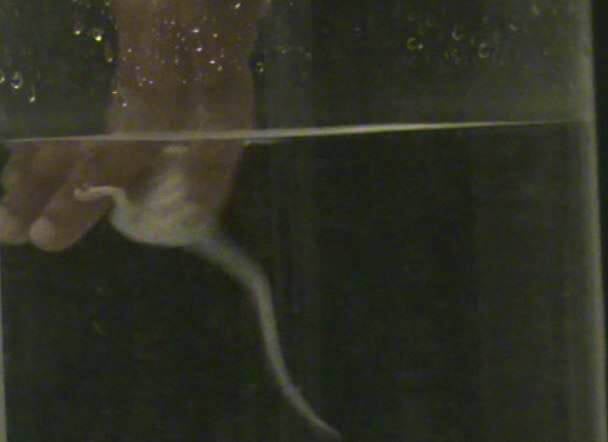Banned! PETA’s Near-Drowning Mice Ads Rejected From Buses
First Group has refused to place PETA ads depicting the forced swim test – an experiment conducted at the universities of Bath and Bristol – on buses taking students to and from the institutions.

 The ads highlight the cruelty of the experiments, during which mice are forced to swim for their lives in beakers of water. First Group stated the reason it rejected the ads was “due to the sensitivity of the subject”.
The ads highlight the cruelty of the experiments, during which mice are forced to swim for their lives in beakers of water. First Group stated the reason it rejected the ads was “due to the sensitivity of the subject”.
What Are University Experimenters Doing to Mice?
University experimenters place mice in containers filled with water and watch them paddle furiously in search of an exit as they try to keep their heads above water. Intermittently, they float. Some experimenters claim that this test can be used to screen drugs for antidepressant properties, but this simply isn’t true.
PETA obtained video evidence showing the animals used in forced swim test experiments in University of Bath laboratories. Similar experiments are being conducted at the University of Bristol.
Forced Swim Experiments Are Bad Science
Using forced swim experiments in an attempt to study human neurobehavioural conditions is not only appallingly cruel but also pointless. The wider scientific community condemns the test, and many companies have already banned its use.
These experiments do nothing more than waste animals’ lives and delay the development of new, effective treatments, which are desperately needed.
Organisations Are Saying Goodbye to Forced Swim Experiments
After PETA provided King’s College London with scientific evidence showing the failings of the forced swim test, the university confirmed it does not intend to conduct the test on any species going forward.
In September 2020, the University of Adelaide announced that it would no longer subject animals to the test. Additionally, 14 companies – including GlaxoSmithKline, AstraZeneca, Pfizer, Johnson & Johnson, Roche, Bristol Myers Squibb, Bayer, Novo Nordisk, AbbVie, Boehringer Ingelheim, and Sage Therapeutics – have banned the test after hearing from PETA or its affiliates.
It’s time the universities of Bath and Bristol followed suit and invested in humane, human-relevant, non-animal methods.
What You Can Do for Mice
Join PETA in urging the University of Bath and the University of Bristol to ban the near-drowning of animals. Using forced swim tests in an attempt to study human mental illness is not only appallingly cruel but also utterly pointless.
Send both universities a message urging them to ban the forced swim test:






